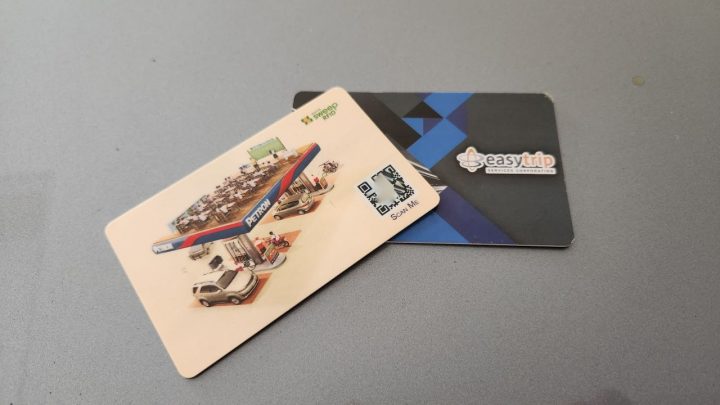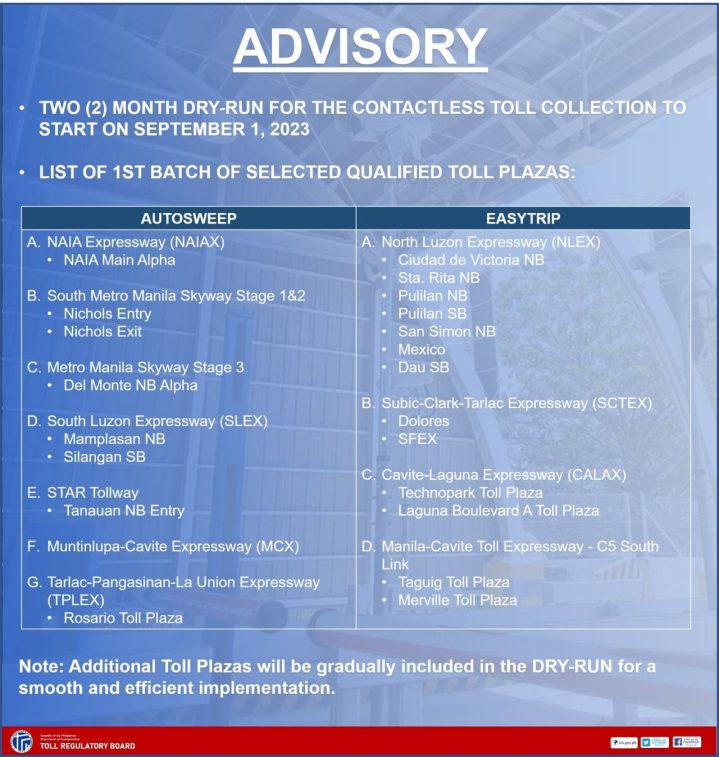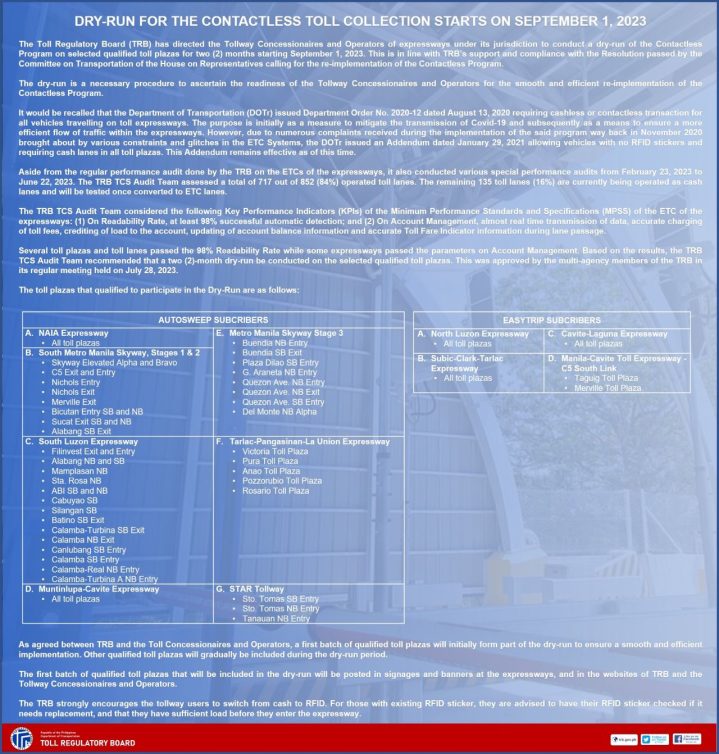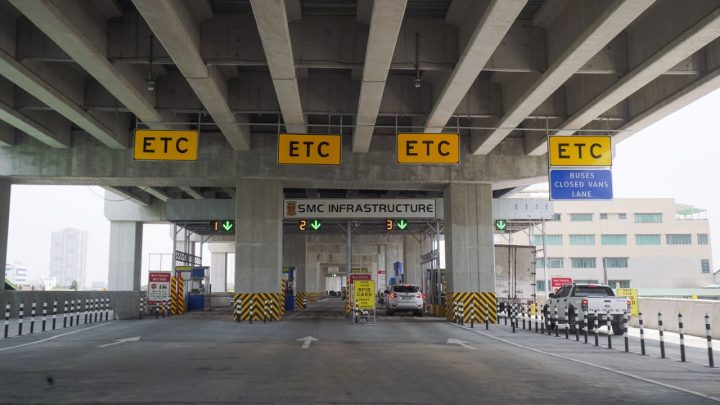
This was always the plan and the dry run for Contactless Toll Collection will start on September 1, 2023. For 2 months, specific toll plazas will no longer accept cash payments for vehicles that wish to enter the expressway. For its duration, the Toll Regulatory Board announced that additional plazas would be gradually added. Here’s what you need to know.
Contactless Toll Collection 2-month dry run covers those that require Easytrip and Autosweep RFIDs
Table of Contents

Photo: TRB
A fully Contactless Toll Collection system has long been in the works, but as we know, has been put off due to several reasons. The biggest of which is the countless glitches or, in most cases, the non-working electronic toll collection readers. This seems to have been remedied, though as the dry run is set to begin at the start of next month.
To start, here are the specific toll plazas that will be part of the first batch of the Contactless Toll Collection dry run:
Autosweep
NAIA Expressway (NAIAX)
- NAIA Main Alpha
South Metro Manila Skyway Stage 1&2
- Nichols Entry
- Nichols Exit
Metro Manila Skyway Stage 3
- Del Monte NB Alpha
South Luzon Expressway (SLEX)
- Mamplasan NB
- Silangan SB
STAR Tollway
- Tanauan NB Entry
Muntinlupa-Cavite Expressway (MCX)
Tarlac-Pangasinan-La Union Expressway (TPLEX)
- Rosario Toll Plaza
–
Easytrip
North Luzon Expressway (NLEX)
- Ciudad de Victoria NB
- Sta. Rita NB
- Pulilan NB
- Pulilan SB
- San Simon NB
- Mexico
- Dau SB
Subic-Clark-Tarlac Expressway (SCTEX)
- Dolores
- SFEX
Cavite-Laguna Expressway (CALAX)
- Technopark Toll Plaza
- Laguna Boulevard A Toll Plaza
D. Manila-Cavite Toll Expressway – C5 South Link
- Taguig Toll Plaza
- Merville Toll Plaza

Photo: TRB
As mentioned earlier, more and more toll plazas will be added within the 2-month dry run of the Contactless Toll Collection and so far, these are all the qualified toll plazas that are set to be part of the dry run:
Autosweep
NAIA Expressway – All Toll Plazas
South Metro Manila Skyway, Stages 1 and 2
- Skyway Elevated Alpha and Bravo
- C5 Exit and Entry
- Nichols Entry
- Nichols Exit
- Merville Exit
- Bicutan Entry SB and NB
- Sucat Exit SB and NB
- Alabang SB Exit
South Luzon Expressway
- Filinvest Exit and Entry
- Alabang NB and SB
- Mamplasan NB
- Sta. Rosa NB
- ABI SB and NB
- Cabuyao SB
- Silangan SB
- Batino SB Exit
- Calamba-Turbina SB Exit
- Calamba NB Exit
- Canlubang SB Entry
- Calamba SB Entry
- Calamba-Real NB Entry
- Calamba-Turbina A NB Entry
Muntinlupa-Cavite Expressway – All Toll Plazas
Metro Manila Skyway Stage 3
- Buendia NB Entry
- Buendia SB Exit
- Plaza Dilao SB Entry
- G. Araneta NB Entry
- Quezon Ave. NB Entry
- Quezon Ave. NB Exit
- Quezon Ave. SB Entry
- Del Monte NB Alpha
Tarlac-Pangasinan-La Union Expressway
- Victoria Toll Plaza
- Pura Toll Plaza
- Anao Toll Plaza
- Pozzorubio Toll Plaza
- Rosario Toll Plaza
STAR Tollway
- Sto. Tomas SB Entry
- Sto. Tomas NB Entry
- Tanauan NB Entry
–
Easytrip
North Luzon Expressway – All Toll Plazas
Subic Clark Tarlac Expressway – All Toll Plazas
Cavite-Laguna Expressway – All Toll Plazas
Manila-Cavite Toll Expressway-C5 Southlink
- Taguig Toll Plaza
- Merville Toll Plaza

Two criteria that needed to be met before a dry run of the Contactless Toll Collection could even be considered are Readability Rate and Account Management. For the former, there must be at least a 98% successful automatic detection of the RFID tag and for the latter, there must be an almost real-time transmission of data, accurate charging of toll fees, crediting of load to the account, updating of account balance information and accurate Toll Fare Indicator information during lane passage.
The TRB has shared that several toll plazas and toll lanes passed the 98% Readability Rate while “some” expressways passed the parameters on Account Management. This ultimately led to the recommendation and subsequent approval of the 2-month-long Contactless Toll Collection dry run.
In case you still don’t have both installed, here’s our easy-to-follow guide on all the RFID installation sites of both Autosweep and Easytrip 167. The Contactless Toll Collection will happen, and you wouldn’t want to be caught without an RFID tag installed on your vehicle; that would be a major hassle. Such is the price of progress and technology.
Let’s all hope that the TRB has safeguards and backup plans in place should their readers decide to return to their non-reading, non-working ways. And we all know that that can happen again.


